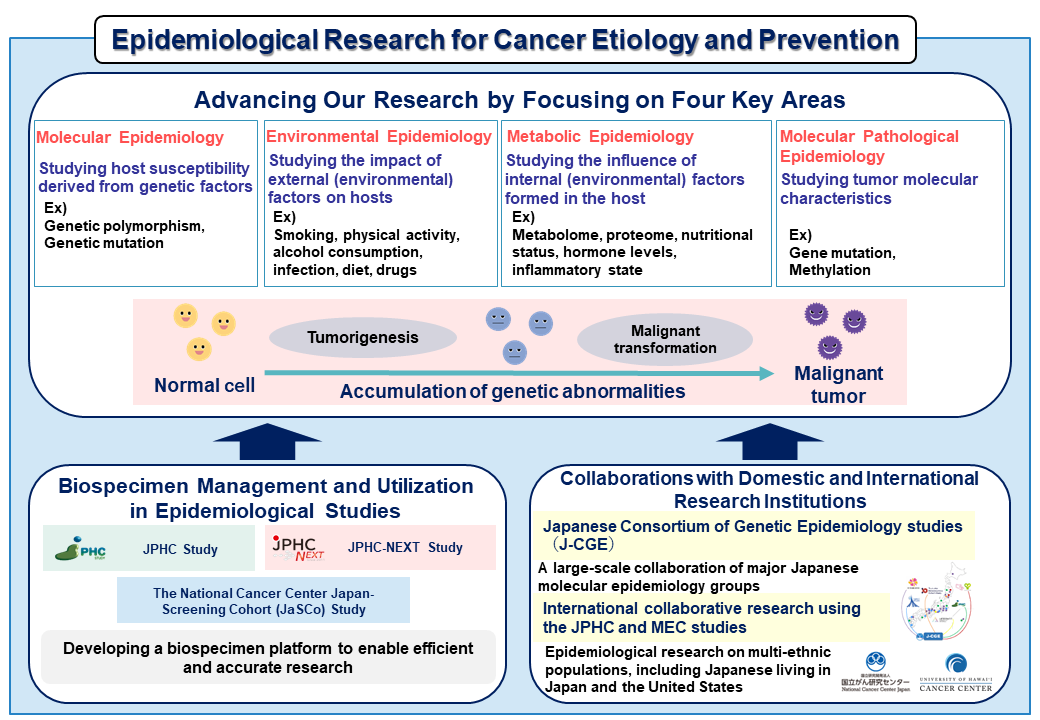Home > Division of Epidemiology
Division of Epidemiology
Our Research
Epidemiology is the study of the frequency and distribution of diseases in specific human populations to identify their determinants. Our division conducts research to identify risk and protective factors for cancer in order to develop new prevention methods.
Specifically, we have established an infrastructure to utilize biological samples collected through epidemiological studies such as the Japan Public Health Center-based Prospective Study (links to an external site managed by the NCC), Japan Public Health Center-based Prospective Study for the Next Generation (links to an external site managed by the NCC), and the National Cancer Center Japan-Screening Cohort Study(links to an external site managed by the NCC). Using this foundation, we analyze various factors from daily life and environment, as well as results from biological samples like blood and urine, to examine their association with cancer risk (for details, click here).
In addition to research based on single cohorts, we have also built a collaborative framework with major molecular epidemiology research groups in Japan. Through this, we promote research that contributes to identifying the causes of lifestyle-related diseases, including cancer, among the Japanese population and to developing personalized prevention (for details, click here). Furthermore, we engage in international collaborative research with the University of Hawai'i Cancer Center and the University of Southern California on the "Multiethnic Cohort Study." This epidemiological study uses Japanese populations in Japan and the U.S. as a focal point to conduct research on multiethnic groups, including Caucasian, Native Hawaiian, African American, and Latino populations (for details, click here).
By leveraging this epidemiological research infrastructure and these collaborative opportunities, we are focusing our efforts on the four research areas shown in the diagram below, as part of our epidemiological research to elucidate the nature of cancer and develop prevention methods. For more details, please see this page.
The risk and protective factors identified through such epidemiological research must be translated into the development of effective cancer prevention methods that can be implemented in the daily lives of the public. The development of these methods is primarily handled by the Division of Prevention. Working in close collaboration, we are focusing on translating the evidence from our epidemiological studies into practical cancer prevention.
Epidemiology is an interdisciplinary field that requires the collaboration of researchers from diverse backgrounds. In our division, numerous experts are actively involved, including not only medical professionals such as doctors, nurses, and pharmacists, but also specialists in fields like nutrition, analytical science, molecular biology, and information engineering. If you are interested in epidemiological research, we warmly invite you to join us.
Inquiry (for those interested in epidemiological study)
We actively seek individuals interested in collaborative opportunities to join our team. Postdoctoral researchers, visiting research fellows, partnering graduate school students, and trainees who wish to contribute our projects are encouraged to contact our division chief, Dr. Iwasaki, at moiwasak@ncc.go.jp. Additionally, we also extend our welcome to those with an interest in research assistant roles. Research assistants are responsible for data management in epidemiological studies, IT infrastructure management covering databases and networks, and management of biological specimens such as blood and urine.
